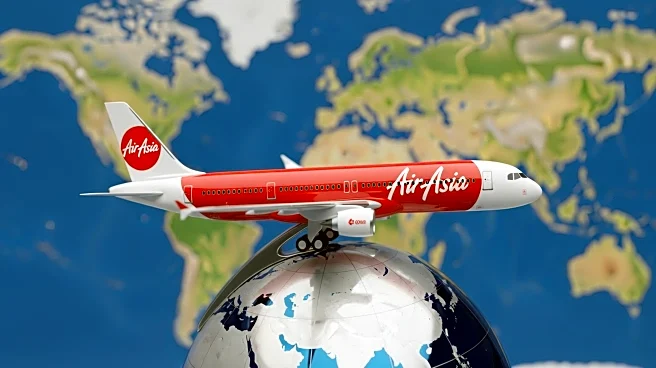What's Happening?
Capital A, the parent company of budget airline AirAsia, is exploring the establishment of a Middle Eastern hub in Bahrain. This initiative involves setting up a Bahrain-based air operator's certificate
(AOC) to facilitate onward connections. A preliminary agreement has been signed with Bahrain's Ministry of Transportation to study the feasibility of launching flights from Malaysia, Thailand, the Philippines, and Indonesia to Bahrain over the next five years. The restructuring of Capital A's aviation operations, which includes the consolidation of its carriers under AirAsia X, is nearing completion. The company plans to operate more than 25 daily flights via Bahrain by 2030, using single-aisle aircraft to reach destinations in Europe, Africa, and the Middle East.
Why It's Important?
This development is significant as it marks a strategic expansion for AirAsia into the Middle Eastern market, potentially increasing its global footprint. By establishing a hub in Bahrain, AirAsia aims to enhance its connectivity between Asia, Europe, and Africa, which could lead to increased passenger and cargo traffic. The move is also expected to foster economic cooperation between Bahrain and the countries involved, potentially boosting local economies and creating job opportunities. The establishment of maintenance facilities and the training of Bahraini nationals in aviation-related fields could further strengthen Bahrain's position as a strategic connector in global aviation.
What's Next?
Capital A's plans include the development of a new maintenance facility in Bahrain, which will feature hangars and workshops for narrowbody and widebody aircraft. This facility aims to maximize aircraft uptime and unlock additional revenue opportunities for local and regional airlines. Additionally, Teleport, Capital A's logistics arm, plans to base freighters in Bahrain to expand its international network. The partnership with Bahrain is expected to enhance the kingdom's role as a strategic connector between Asia, Europe, North America, and other regions, potentially leading to further collaborations in airline operations, cargo, and maintenance.
Beyond the Headlines
The collaboration between Capital A and Bahrain could have long-term implications for the aviation industry in the region. By investing in local infrastructure and workforce development, the partnership may contribute to the growth of Bahrain's aviation sector. This initiative also reflects a broader trend of airlines seeking to establish strategic hubs in key geographic locations to optimize their global networks. The focus on training and development of local talent could lead to a more skilled workforce, benefiting the aviation industry in the Middle East.









